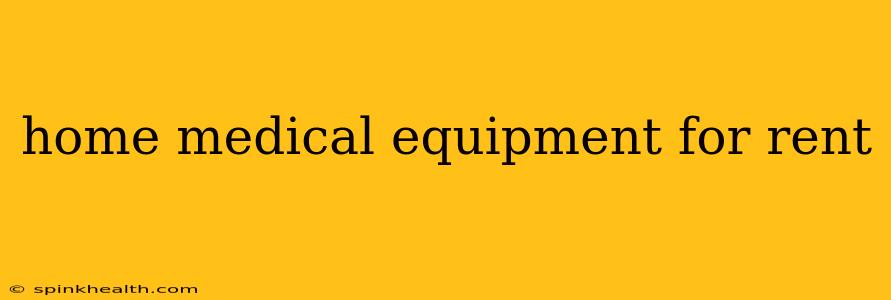Life can throw curveballs, and sometimes, we need a little extra help at home to manage health challenges. This is where home medical equipment rentals come in. Whether it's a temporary need after surgery or ongoing support for a chronic condition, renting medical equipment can be a cost-effective and convenient solution. But navigating the world of home medical equipment rentals can feel overwhelming. This guide will walk you through the process, answering your burning questions and helping you find the perfect equipment for your needs.
Imagine this: Grandma just had knee replacement surgery and needs a walker for a few weeks to regain her mobility. Buying a walker would be expensive, and she likely won't need it long-term. Renting offers the perfect solution – temporary use without the hefty upfront cost. This scenario highlights the power of renting home medical equipment.
Let's dive into the specifics:
What Types of Home Medical Equipment Can I Rent?
The range of home medical equipment available for rent is surprisingly broad. This isn't just about walkers and wheelchairs. You can often rent:
- Mobility aids: Walkers, wheelchairs (manual and power), rollators, canes, crutches, hospital beds.
- Respiratory equipment: Oxygen concentrators, CPAP machines, nebulizers.
- Other medical equipment: Hospital beds, bedside commodes, shower chairs, ramps, patient lifts.
- Monitoring equipment: Blood pressure monitors, pulse oximeters (although often purchased).
The exact availability will depend on your location and the rental provider.
Where Can I Find Home Medical Equipment for Rent?
Finding a reputable rental provider is key. You have several options:
- Local medical equipment suppliers: These are often the best option for personalized service and local delivery. Check online directories or ask your doctor for recommendations.
- National chains: Some larger medical supply companies offer rental services nationwide, offering convenience but potentially less personalized attention.
- Online marketplaces: While some online marketplaces list rental equipment, proceed with caution and verify the provider's legitimacy before renting.
How Much Does Home Medical Equipment Rental Cost?
The cost of renting home medical equipment varies greatly depending on the type of equipment, rental duration, and the provider. Factors like the condition of the equipment and any additional services (delivery, setup, maintenance) can also influence the price. Always get a clear quote upfront, outlining all associated costs. Don’t hesitate to compare prices from different providers to ensure you're getting the best deal.
What is the Rental Process Like?
The rental process typically involves:
- Contacting a provider: Discuss your needs and the equipment you require.
- Getting a quote: Confirm the cost, rental period, and any additional fees.
- Agreement and delivery: Sign a rental agreement and arrange for delivery and setup (if needed).
- Usage and maintenance: Use the equipment as instructed and report any issues to the provider.
- Return: Return the equipment at the end of the rental period.
How Long Can I Rent Medical Equipment For?
Rental periods vary greatly depending on the provider and the type of equipment. Some providers offer short-term rentals (a few weeks or months), while others allow for longer-term rentals. Discuss your needs with the provider to determine the appropriate rental duration.
What Happens If the Equipment Malfunctions?
Reputable providers will have policies in place to address equipment malfunctions. Typically, they offer repair or replacement services. Always report any problems promptly to avoid delays in your care.
What Insurance Covers Home Medical Equipment Rental?
Many insurance plans cover at least a portion of the cost of home medical equipment rental, particularly if it's medically necessary. Check with your insurance provider to determine your coverage before renting. You may need pre-authorization or a referral from your doctor.
Finding the right home medical equipment rental solution is about more than just finding the cheapest option. It’s about finding a trustworthy provider who can offer the support you need, ensuring your comfort and well-being. Remember to always do your research, compare options, and ask questions to make an informed decision.

